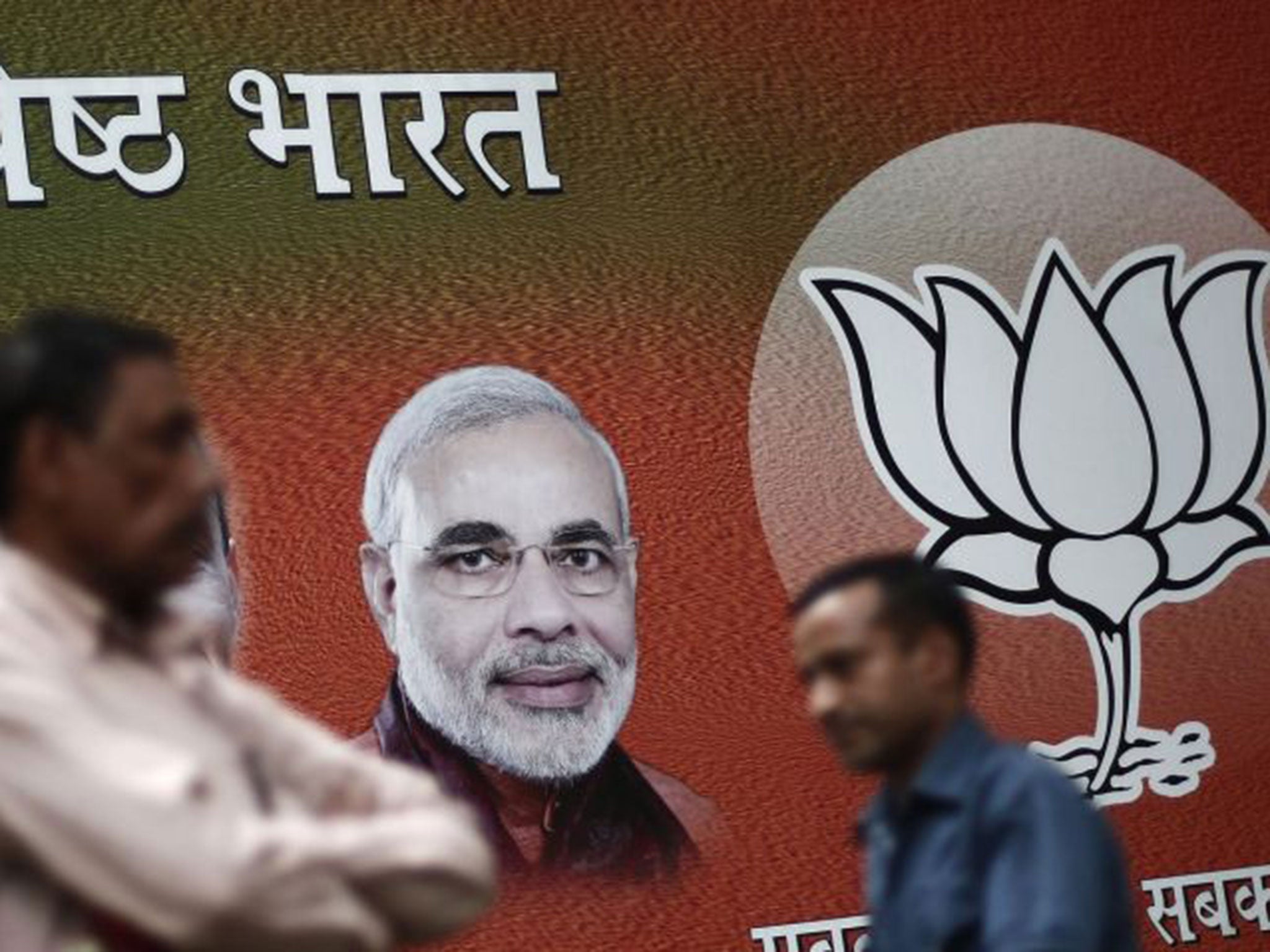India elections: BJP's Narendra Modi set to become next PM, according to exit polls

The controversial chief minister of Gujarat, Narendra Modi, is set to become India’s next prime minister, if exit polls published after voting closed are correct. The polls, which have been wildly off in the past, suggest the ruling Congress party will suffer its worst ever result.
After India completed its ninth and final day of voting on Monday, a flurry of polls predicted Mr Modi and his Bharatiya Janata Party (BJP) are going to comfortably manage to form the next government.
While they predict he alone will get a little short of a clear majority, once the BJP’s traditional partners in the so-called National Democratic Alliance (NDA) coalition are included, he will pass more than 272 seats – half of the total 543 seats. The official result is to be announced on Friday.
“History will remember the 2014 elections as historic and marking a paradigm shift from conventional electioneering,” Mr Modi said in a post on social media. “Normally, the party in power sets the agenda of the campaign but for the first time it was not the case. Far from setting the agenda, the ruling party was neither proactive nor responsive.”
The News X channel suggested the ruling Congress party will win as few as 78 seats and its coalition 101. It said the BJP would secure 251 seats and the NDA as many as 289. Meanwhile, the Headlines Today channel said the Congress coalition would get 115 seats and the NDA 272. A poll by the CNN-IBN channel predicted the BJP will win as many as 45-53 out of a total of 80 seats in the crucial state of Uttar Pradesh alone. It currently has just ten.
While the news channels embarked on a detailed scrutiny of the various local contests and regional battles across India, the overarching theme of the series of polls was of a clear win for the 63-year-old Mr Modi.
“Historically the exit polls have tended to overestimate the performance of the BJP compared to the Congress. But even when this is factored in, the big take-away is that there will likely be a stable, BJP-led government,” said Milan Vaishnav, a South Asia expert at the Carnegie Endowment in Washington.
Few were surprised by this. Most analysts agreed that Mr Modi effectively seized the momentum during the many months of electioneering across India, holding more than 400 rallies and traversing thousands of miles.
During his campaign, he repeatedly pushed the message of development and jobs, even while some of his BJP colleagues continued to stir communal tension. While many Muslims refused to vote for him because of the killing of hundreds of Muslims in Gujarat in 2002, lots of voters were attracted by his aspirational, modern campaign.
By contrast, the ruling Congress party, whose lacklustre campaign was headed by Rahul Gandhi, had equally been expected to do badly. After ten years in power, the most recent of them seen as drifting and ineffectual, the party has been facing a widespread sentiment of anti-incumbency.
Yet for all the smiling faces of BJP leaders beaming from the television screens on Monday evening, some voices urged caution. Election surveys in India have in the past been disastrously wrong, most dramatically in the 2004 general election when it was widely predicted the BJP would hold on to power on the back of its “Shining India” campaign. As it was, they were defeated by Congress.
Figures showed that the turnout for the election to select India’s 16th government since securing independence in 1947, was 66 per cent - a record. It bettered the previous high of 64 per cent, recorded in the 1984-85 election, when Congress leader Rajiv Gandhi rode a sympathy wave to come to power after the assassination of his mother, then Prime Minister Indira Gandhi.
Among the contests being decided on the final day of voting was the constituency of Varanasi, an ancient city on the Ganges river that is sacred to Hindus and one of two seats from where Mr Modi competed. He was being directly challenged in Varanasi by 41 other candidates, perhaps most forcefully by Arvind Kejriwal, the leader of a new, grass-roots party that has campaigned against corruption
Observers say the election was particularly hard fought. Mr Modi and Mr Gandhi often traded personal barbs. The BJP leader contrasted Mr Modi’s privileged upbringing as part of the Nehru-Gandhi family, with his own relatively impoverished background in small-town Gujarat.
Meanwhile, Mr Gandhi claimed Mr Modi, long tarnished over the massacre of hundreds of Muslims in Gujarat while he was chief minister, would destroy the secular foundation of India.
Over the weekend, the Congress and the BJP traded final attacks ahead of the last day of polling. At a rally in Varanasi, Mr Gandhi claimed Mr Modi’s speeches were full of anger. He added: “But India works on love and not on anger. India is for everybody. It is for Hindus, Muslims, Sikh and Christians. It belongs to every caste and community, poor and rich people and it will remain for everybody.”
The BJP complained that Mr Modi had been prevented by election officials from holding a major rally in the city ahead of polling. “Why was the Rahul roadshow permitted when Mr Modi was denied permission in the same area,” said senior BJP leader Arun Jaitley.
Join our commenting forum
Join thought-provoking conversations, follow other Independent readers and see their replies
Comments